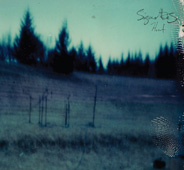It is my great pleasure to present...
 ... a brand new record, Letters from Sinclair's Eve. And not only that, but a brand new website: Adamwhipple.com! Plus, you are entitled to a FREE DOWNLOAD from the new EP.
... a brand new record, Letters from Sinclair's Eve. And not only that, but a brand new website: Adamwhipple.com! Plus, you are entitled to a FREE DOWNLOAD from the new EP.What does all of this mean? Yes, sadly, it means that we shall bid a fond adieu to Quill Upon the Paper. It has been our means of communication, the formica-topped diner table over which we've shared coffee, for some 7 years, and we shall miss it. Heretofore though, all notices, articles, and wanted posters shall be plastering the walls of the new site. The fantastic part is that our new web stomping grounds has room for music, blogging, photographs, a store, and other things I've only dreamed of. Like any new house, we'll settle into it.
Letters from Sinclair's Eve is a five-song EP that has grown out of the intimate and haunted grounds of recording at home. It is a testament to the patience and holy encouragement on the part of my wife to see the dining 'nook' at our house populated by a grimly determined old upright, a small and crackly Kimball organ, and stacks upon stacks of instruments in and out of their cases, all hoping for that great day when we get a room to ourselves where they don't get swoopingly put away like the playthings in the Velveteen Rabbit. I spent the course of several months stuffed into this cleft in the rock, sidling up to the piano and dangling mics from the chandelier, hoping to see the back of the Almighty. What started out as a set of demos turned into something new altogether. A four-star chef offering to buy squash from one's kitchen garden would not be far from the mark. It seemed odd as the inklings of the main idea trickled in, but it had a mind of its own.
After many late nights, I packed up these little orphan songs and trotted them across town to Dylen Terflinger, hoping that we could scrub behind their ears and dress them up nice. Dylen was most encouraging, and visibly excited, and we put the music through the wringer, waiting for the gems on the other side. My deepest heartfelt thanks to both the inimitable Dylen of KnoxSound Studios for mixing the record and to the indefatigable Jeremy LaDuke for designing, building, and hosting the website.











